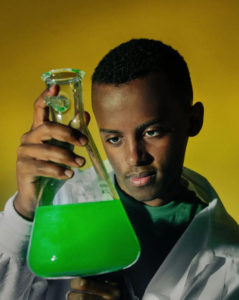
By Lincoln DePradine
Heman Bekele, a Black American science student, is one of the world’s latest inventors, joining the fight against one form of the deadly cancer disease.
He has created a skin cancer-treatment soap that Bekele says “will be able to make a direct impact on somebody else’s life”.
The invention by Bekele, who was born in Ethiopia and moved to the United States when he was four, is “huge”, said Canadian biochemist Francis Jeffers, who has spent more than 30 years promoting and highlighting a community-focused, Afro-centric view of STEM – science, technology, engineering and mathematics.
“We have a young Black boy going viral for looking at innovation with entrepreneurship value. It will have a direct impact on other kids; that is almost certain. It also gives STEM promoters a lot to work with. He’ll be a poster boy,” Jeffers told The Caribbean Camera.
Bekele has expressed appreciation to Deborah Isabelle, a 3M employee and his mentor.
Last year, Bekele was named “America’s Top Young Scientist’’ by 3M and Discovery Education, after entering a competition that encourages kids to think of unique ways to solve everyday problems. He received a US$25,000 cash prize in the competition in which he faced nine other finalists.
When asked, what he intended to do with the prize money, Bekele said he would save some for his college education.
However, “more than anything, I’m definitely going to use this prize money to continue research within the field of STEM”, he added.
A lot of his research, Bekele said, started in his family’s kitchen and in their basement. He credits his family, particularly his parents, for setting the stage for his achievements. His mother Muluemebet is a teacher; his father Wondwossen is a human resources specialist for the US Agency for International Development.
“I’ve always been really passionate about science and how things work. Then, slowly, as I grew up, that curiosity started to develop into something more,” said Bekele.
“Growing up in Ethiopia, I always thought people were always getting hit by the hot sun working outside. I didn’t think much of it when I was really little, but as I grew up I realized how big an issue [skin cancer] really is. Not only in Ethiopia but everywhere around the world.”
Bekele, 15, has just been named “2024 Kid of the Year’’ by Time magazine for his research and development of his Melanoma Treating Soap (MTS).
He was chosen, said the magazine, for creating a soap that could be a “more accessible way to deliver medication to treat skin cancers, including melanoma”.
“I’m really passionate about skin-cancer research,” says Bekele, who is spending part of this year’s summer working in a laboratory at the Johns Hopkins Bloomberg School of Public Health in Baltimore.
“It’s absolutely incredible to think that one day my bar of soap will be able to make a direct impact on somebody else’s life. That’s the reason I started this all in the first place.”
Anyone can get skin cancer; but, people with certain characteristics may be more at risk than others. They include people with light skin complexion; seniors; folk with blue or green eyes, or blond or red hair; and, those who have a large number of moles.
Skin cancer is reported to be the most common type of cancer diagnosed in the United States and, according to experts, it’s related to sun-exposure and most often found in areas such as head, neck and arms.
Most skin cancers are treatable; but, the average price of treatment could cost as much as $40,000.
His goal with the MTS, says Bekele, is to create a soap that could treat skin cancer, and also to make it affordable for everyone who needs it.
Jeffers – founder, curator and executive director of the travelling Canadian Multicultural Inventors Museum (CMIM) – said Bekele’s scientific trajectory included “good advisors who mentored him’’, as well as a methodology for development of his MTS product, and the combining of innovation and entrepreneurship.


